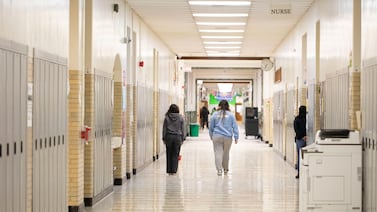The two Tennessee school districts that taught all their students primarily remotely last year saw their test scores fall further than the state’s average decline.
But those districts in Memphis and Nashville also serve the highest proportions of students who are economically disadvantaged, of color, and learning a new language — some of the student groups that have been most affected by the pandemic.
Both issues have been factors in falling student achievement rates across the United States after a year of educational and social disruptions, according to national data.
Tennessee released district-level test scores this week showing that Memphis-based Shelby County Schools had an overall drop in proficiency of 11 percentage points from 2019 to 2021, compared with the statewide slide of 5 percentage points.
Overall proficiency for Nashville public school students declined by just over 8 percentage points.
Both school systems stayed remote the longest in the contentious debate with elected state officials over how best to reopen schools last year. Gov. Bill Lee charged the districts weren’t putting the needs of students first, while their superintendents said they were prioritizing safety in communities disproportionately affected by the deadly coronavirus.
Now the question is how Lee’s administration and the GOP-controlled legislature will respond to the grim results from Tennessee’s two largest school systems, which are located in Democratic strongholds.
At an Aug. 2 news conference to discuss state-level test results, the Republican governor highlighted that achievement gaps had “greatly widened,” with a disproportionate negative impact on minority students.
“The lack of in-person learning this year has exasperated (cq) an already bad situation,” Lee said, calling the results “unacceptable.”
Along with this week’s spreadsheet of district results, the state education department released a 312-page online report to give a snapshot of each school system’s performance in third-grade reading, which is considered an indicator of future academic success, and eighth-grade math, which is necessary to understand subsequent courses on algebra and mathematical reasoning.
At the request of leaders of the legislature’s House Education Committee, the report also labeled each district’s primary way of teaching last year.
Shelby County and Metro Nashville stood out as the only districts that taught all students primarily online, although several school systems were identified as providing mostly remote instruction to their older students. About 60% of districts were identified as teaching their students mostly in person, with the remainder providing a mix of both in-person and remote instruction.
During a presentation this week about test scores in Memphis, Shelby County school leaders stood by their decision to teach mostly online last year.
“Recognizing that shuttering schools could impact academic achievement, the risks to public health and safety were too great to be ignored,” officials said in a statement.
Nashville schools Director Adrienne Battle said test results for Tennessee’s second largest district weren’t surprising.
“We knew economically disadvantaged students were hit hardest by the pandemic and saw the greatest declines,” she said. “And urban school districts like Metro Nashville [and] Shelby tend to have the highest proportion of economically disadvantaged students in the state.”
Almost a third of Tennessee’s 1 million students are from low-income families, which comprise about 56% of the student population in Shelby County Schools and 38% in Metro Nashville.
State officials say test scores have confirmed the pandemic has been hardest academically on historically underserved students.
Those demographics apply to the state’s Achievement School District, which is trying to turn around 25 low-performing schools in Memphis and two in Nashville. Three out of every five ASD students are considered economically disadvantaged, while 98% are people of color.
The ASD provided both in-person and remote instruction last year and also saw its scores drop precipitously.
The 2021 results provide the most detailed look so far at how the pandemic has slowed student learning since the first COVID cases reached Tennessee in March of 2020. Standardized testing was canceled nationwide last year, including the Tennessee Comprehensive Assessment Program, also known as TCAP.
Tennessee’s school-level results will be released later, while families can use the state’s TCAP Family Portal to access student test scores.
School, district, and state results are scheduled to be published in a more user-friendly format this fall through Tennessee’s online report card.






